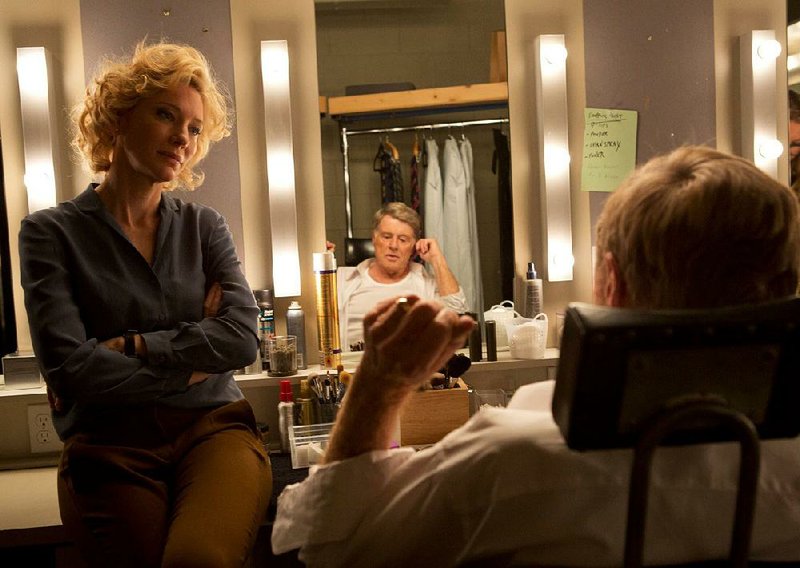One of the great frustrations of the journalistic trade is knowing something interesting or important and not being able to report it for lack of documentation or sourcing. Among good reporters this is an almost chronic condition, for intuition and gossip almost always run ahead of verification. Part of the job's discipline is learning how to say no more -- and no less -- than one ethically can.
So it's not hard to understand what the filmmakers behind the well-acted political thriller Truth are getting at: What you read in the newspapers and hear talked about on the TV isn't truth at all, it's vetted information delivered in an appropriate deadpan. It's the very tip of the iceberg. It's the official version of events.
Truth
85 Cast: Cate Blanchett, Robert Redford, Dennis Quaid, Topher Grace, Elisabeth Moss, Stacy Keach, John Benjamin Hickey, Bruce Greenwood, David Lyons, Dermot Mulroney, Chris Mulkey
Director: James Vanderbilt
Rating: R, for language and a brief nude photo
Running time: 121 minutes
In the movie, which recounts the efforts of CBS news producer Mary Mapes (Cate Blanchett) and managing editor/anchorman Dan Rather (Robert Redford) to tell the truth about President George W. Bush's Vietnam-era service in the Air National Guard, it's suggested that sometimes the search for truth is frustrated by standards of proof that some editors and newsgathering organizations insist upon. No doubt this sometimes happens, but those familiar with the facts of the particular episode that, in 2004, led to the firing of Mapes and Rather's eventual departure from CBS, might wish the filmmakers had picked a better example with which to make their case.
What basically happens is that Mapes believes she has convincing evidence that Bush shirked his duty and went AWOL. It's suggested that Bush had received preferential treatment in obtaining his commission and that he had failed to fulfill his obligations to the Guard. She knows this in her bones. There's lots of circumstantial stuff in the record, but she can't get any of Bush's former superiors to go on the record. To the contrary, most of them seem to want to defend Bush.
But then Lt. Col. Bill Burkett (Stacy Keach), an ailing National Guard veteran, comes forward with what appear to be some smoking-gun documents -- a series of memos in which Bush's commanding officer, Lt. Col. Jerry Killian, criticizes the young pilot's nonperformance and notes the pressure being put on him to cover up for the fortunate son of privilege and political clout. Now they've got him.
Since Killian is dead, Mapes reads the memos over the phone to an officer who was his contemporary. Yes, that sounds like something Jerry would say, is his assessment. A handwriting analyst says the signatures match. Another one has a problem with a superscript (could typewriters do that in the '70s?) but defers to another expert. For reasons that have to do with scheduling -- and with issues of fairness, for they don't want to air the report too close to the imminent election -- they rush the report onto the air.
They put the memos on TV.
And, within minutes, they're being crushed. Bloggers allege the memos are forgeries -- the lines are justified, more like a modern computer printout than a typewritten note. CBS starts backpedaling, the focus shifts away from whether the president shirked his responsibilities to how Mapes and Rather and their team were snookered by documents they couldn't prove were genuine.
We are supposed to align ourselves with Mapes and Rather, which is why they are played by Blanchett and Redford, two rather startling movie stars who do their best to elicit our empathy. Blanchett is remarkably watchable, even if her version of Mapes seems a little too glamorous and high-strung. Redford is Redford, which is odd at first, especially since no apparent effort has been made to make him look like Rather. But eventually this swapping of icon for icon begins to work, as Redford seems to be slyly parodying Rather's twinkling eyes and mitigated Texas drawl.
The movie employs other well-known actors in small roles, and Dennis Quaid needs only a few lines to distinguish himself as Lt. Col. Charles Rogers, a retired Marine Corps officer turned analyst and investigative journalist. Topher Grace fares less well in a slightly bigger role as idealist researcher Mike Smith because he has to deliver the film's most groan-inducing line. (It comes right after Redford's Rather asks him why he got into journalism.) Elisabeth Moss has a few minutes of screen time; John Benjamin Hickey has the thankless role of Mark Wrolstad, Mapes' husband.
James Vanderbilt, best known as the screenwriter of David Fincher's Zodiac, directs for the first time here, and while he's very good at limning the journalistic process -- the frantic phone calls to sources, the deadline anxieties, the familial bonds that form among the team -- the film's less convincing when it seeks to humanize Mapes. We are told that she asks questions because her abusive father punished her curiosity, so we have a scene where her daddy makes her cry. Presumably she's given a family so she can miss and neglect them.
Since the movie is based on Mapes' 2005 book Truth and Duty: The Press, the President, and the Privilege of Power, it's no surprise that it's highly sympathetic to Mapes, suggesting that while she may have made mistakes, her heart was pure and the story she and Rather reported worthy and fair. In the end the movie seems to argue that the documents could have been genuine, and they probably reflected the way things really were, and anyway, isn't the story of the president's failure to meet his obligations to the military during wartime more important than the veracity of certain documents that seem to buttress this finding?
Well, to be blunt about it, no. And while it's possible to notice the cinematic virtues of Truth without accepting its hypothesis, one wonders if the film doesn't represent a missed chance. A better movie might have given us more ambiguous protagonists, ones whose hunt for the truth might be colored by careerism and even politics. That a CBS investigation eventually concluded that the memos weren't necessarily forgeries hardly exonerates Mapes; the film's effort to leave us with the impression that they must have been genuine is disingenuous. They might have been real, they might have been cooked up by Bush's enemies; it has even been suggested that they might have been planted by Karl Rove or his operatives to sabotage Mapes' investigation.
But the truth is Mapes and Rather and their team didn't know what those documents were or where they came from -- they made wishful assumptions. And that's just not allowed.
Truth is a little too interested in lionizing Mapes and company, a little too credulous and hero-worshippy. That wouldn't be a problem if so many of us didn't accept movies "based on a true story" as reliable history. I get what they're getting at, calling this movie Truth. But a better title might be Shame.
MovieStyle on 10/30/2015

